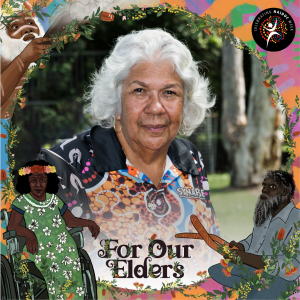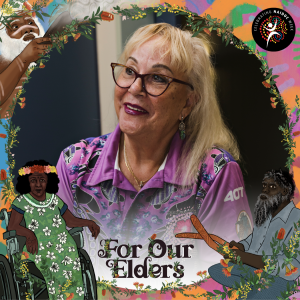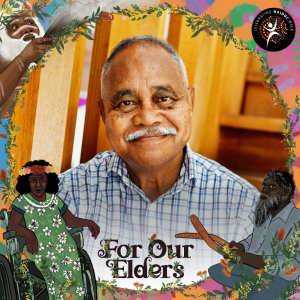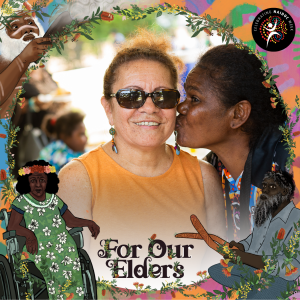NAIDOC Week 2023
This NAIDOC week we celebrate our Synapse Elders. Our Elders guide and ensure we stay connected to community and culture.

Aunty Jeanette Mossman
Who are your mob?
Wakkaman mob on my mum side and Kuku Yalanji on my Father’s side.
What part did/do your Elders play in your life?
I grew up with my Aunt and Uncle and they taught us how to hunt and feed ourselves. All the knowledge I have about fishing and hunting, I have learnt from them.
What is most important to you about your work at Synapse?
My people. At long last I am working with Indigenous people. I have worked all my life but never with just Indigenous people. I am so proud of what I do now. Other Indigenous staff at Synapse have taken me back to what is important and back to Country and I am so grateful for that.
What do see as your role as an Elder at Synapse and wider community?
As an Elder I feel that I relate to the tenants, and I can be their friend and I can also guide them as an Elder. As a worker, I love all the staff as they respect me as an Elder. I love them all.
What do you want others to know or learn this NAIDOC week?
To respect their Elders and work alongside them. Just be one. We all walk on the same path. It’s the Elders that show us the way, we are not going to be here forever. One day you will be an Elder yourself so learn as much as you can to help guide others.

Aunty Colleen
My name is Aunty Colleen, I am so proud of my cultural heritage being both Aboriginal and Torres Strait Islander or Zenadth as it is known. My mother’s mob are the Kaurareg from Thursday Island [Waiben], with close cultural ties to Coconut Island [Poruma], and my Great Aka [Grandmother] on my mother’s side was a Traditional Owner of Poruma. My Aboriginal mob are the Tjungundi who are from the Cape York area, where my Great Grandmother was born on the banks of the Batavia River, was also a traditional owner.
What part did/do your Elders play in your life?
The Elders in my life were my parents, Aunties and Uncles and because my mother was taken from her parents and placed in the Orphanage in the Catholic Church on Waiben Island until she was 17 years old, I learnt most of my cultural knowledge from my Aunties and Uncles. My Elders were and still are the important people who I looked up to when growing up, but my Aunty Mary who lived on Waiben taught me so much about cultural knowledge and my heritage.
What is most important to you about your work at Synapse?
While I worked at Synapse, I wear several hats as a Synapse Elder, a Murri court Elder and a Community Elder. I feel that the most important part about the work I do at Synapse and the wider community is empowering community with the knowledge and understanding of brain injury and complex disability by yarning and raising awareness. The work that I do at Synapse is important to the people I serve in the Murri Courts and the justice system, as research has shown that a high percentage of our mob have been incarcerated with undiagnosed brain injury and or complex disability. I love the work I do at Synapse because I know that it is not only making a difference to our mob but also to the wider community. We at Synapse are very lucky to have a C.E.O [DR. Jennifer Cullen] who is a First Nations Person, heading a non-Indigenous organisation.
What do you want others to know or learn this NAIDOC week?
N.A.I.D.O.C. week stands for National Aboriginal and Islander Day Observance Committee, it is a very important time of celebration of our Culture, our history, and the achievements of all Aboriginal and Torres Strait Islander peoples. The theme for 2023 is “For Our Elders”, and what I would like others to understand and appreciate about N.A.I.D.O.C. week is that even though the theme for this year is “For Our Elders”, we as first nations peoples celebrate our Elders every day. We acknowledge the Aboriginal and Torres Strait Islander peoples as the first inhabitants of Australia. We also acknowledge the Traditional Owners and Custodians of this land and their continuing connection to land, sea, and community. We also pay our respects to the Elders, past, present, and emerging and commit to the Spirit of the meaningful reconciliation between First Nations Peoples and Non-Indigenous Australians.

Uncle Adrian Padmore
Who are your mob?
I am an Elder of the Yidinji Clan group from Yungaburra near Atherton.
What part did/do your Elders play in your life?
The Elders played a very important part in my life. In the early years I was taught bush-craft such as setting snares to catch Bush Turkeys and other animals we ate. My Uncles showed me how to properly throw the Boomerangs and how they made them. I was also shown which bush foods we were able to eat and which ones not to touch because they were poisonous. Which plants we were able to use as medicine was also passed on to me. One of the most important aspect of my learning was always to respect my Elders and I have used this as a gauge throughout my life.
What is most important to you about your work at Synapse?
I was originally brought on board to Synapse to assist with a project relating to Aboriginal and Torres Strait Islander prisoners who had a Brain Injury. After completing that project I have continued with Synapse on other projects that feature Aboriginal and Torres Strait Islander involvement. In the work I do at Synapse I treasure the occasions I have been asked to provide a “cultural perspective” on different projects being undertaken by other staff members. I feel my role as an Elder in residence at Synapse is truly valued and not something put on show to benefit the organisation.
What do see as your role as an Elder at Synapse and wider community?
I see my role here in Synapse and the wider community as one of information-sharing and service. My other significant volunteer role outside of Synapse is as a Murri Court Elder in the Richlands Magistrates Court. My role there is one of assisting participants to rehabilitate their lives back to a normal state using cultural methods such as men and women’s groups programs.
What do you want others to know or learn this NAIDOC week?
I always feel that NAIDOC week is an ideal opportunity for all to see the richness of the Aboriginal and Torres Strait Islander cultures. Too many times during the year we are all witness to the negative aspects about these two cultures.

Aunty Denise Tranby
Who are your mob?
Biri Gubba, Jirrdibal, Muluridji, Indinji and Djabugay.
What part did/do your Elders play in your life?
A big role. I used to look after them and they are very important to me to this day. I have looked up to them my whole life, not only culturally but spiritually. They are very dear to me.
What is most important to you about your work at Synapse?
That it is cultural, and it is looking out for our mob. We can understand each other more, everything is cultural way. We one mob.
What do see as your role as an Elder at Synapse and wider community?
Being a role model and an example. Caring for the younger ones. It just automatically comes to us being around Elders all our lives in our everyday living.
What do you want others to know or learn this NAIDOC week?
Important to respect our elders for guidance, if you don’t listen to them, things don’t go good for you. It is important to listen and learn from our Elders.

Uncle Sydney Gray
Who are your mob?
Djabugay
What part did/do your Elders play in your life?
Yes, especially my grandmother. She made me walk the boundaries of country and taught me about our country. She was a big guidance in my life.
What is most important to you about your work at Synapse?
I have worked all my life with Murri people and love that I can still do that here.
What do see as your role as an Elder at Synapse and wider community?
To help guide the younger generation.
What do you want others to know or learn this NAIDOC week?
Learn from our experience and respect Elders, they hold the knowledge.